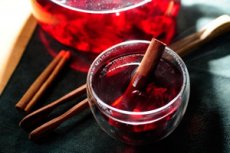New publications
Carcade tea: salvation from the heat
Last reviewed: 02.07.2025

All iLive content is medically reviewed or fact checked to ensure as much factual accuracy as possible.
We have strict sourcing guidelines and only link to reputable media sites, academic research institutions and, whenever possible, medically peer reviewed studies. Note that the numbers in parentheses ([1], [2], etc.) are clickable links to these studies.
If you feel that any of our content is inaccurate, out-of-date, or otherwise questionable, please select it and press Ctrl + Enter.

Hibiscus is a universal drink: you can drink it hot in winter or cold in summer. We especially often think about “red” tea in hot weather. Hibiscus with ice is a great way to quench your thirst and enjoy the pleasant taste.
Karkade, also known as "hibiscus" or Sudanese rose, is one of the traditional drinks of North African and South Asian countries. In addition to its taste, it also has a lot of medicinal properties. It is an excellent antipyretic and cardiovascular remedy. And in Iran, hibiscus is used to stabilize blood pressure.
During recent scientific experiments, scientists came to the conclusion that “red” tea can be successfully used to improve fat metabolism, to normalize the condition of atherosclerosis, coronary heart disease, and diabetes.
In 2010, a study was conducted that confirmed the relevance of drinking hibiscus tea for people with high blood pressure. Participants in the experiment were offered to drink three cups of "red" tea, or a "placebo" in the form of flavored compote. The experiment lasted for a month and a half. It was found that hibiscus provoked a stable decrease in systolic pressure, unlike the "placebo". This effect turned out to be most relevant in the hot season, when the risk of increased pressure in hypertensive patients is especially high.
Hibiscus is also useful for those who watch their weight, as this tea stimulates metabolic processes and has a beneficial effect, in particular, on fat metabolism.
The drink contains a large amount of antioxidants that promote rejuvenation and cleansing of the body.
However, according to some data, not all people can consume hibiscus. Like any herbal preparation, Sudanese rose has its own number of contraindications. For example, according to research by scientists from the American University of Arizona, drinking hibiscus in large quantities has a negative effect on the liver (experts do not specify what volume of the drink is being discussed). Therefore, it is undesirable for people who suffer from any liver pathologies to drink the drink.
In addition, it is not advisable to combine hibiscus with the diuretic hydrochlorothiazide and the antipyretic drug paracetamol, due to the effect of tea on the therapeutic effect of these medications.
It is not recommended to drink " red" tea during pregnancy, although research on this matter is still being conducted.
If you prefer to drink hibiscus and suffer from low blood pressure or diabetes, you need to regularly monitor your blood pressure and blood sugar levels, as the tea has the ability to lower them. Although, to date, doctors have not had a single report that hibiscus has led to an excessive critical drop in certain indicators.
As they say, everything is good in moderation. Despite everything, hibiscus is still recognized as a very healthy drink, which is recommended to be consumed both in winter and summer. In hot weather, it is recommended to add a few drops of lemon juice and a spoonful of honey to the tea - this will support the body and help it to endure excessive loads more easily.
